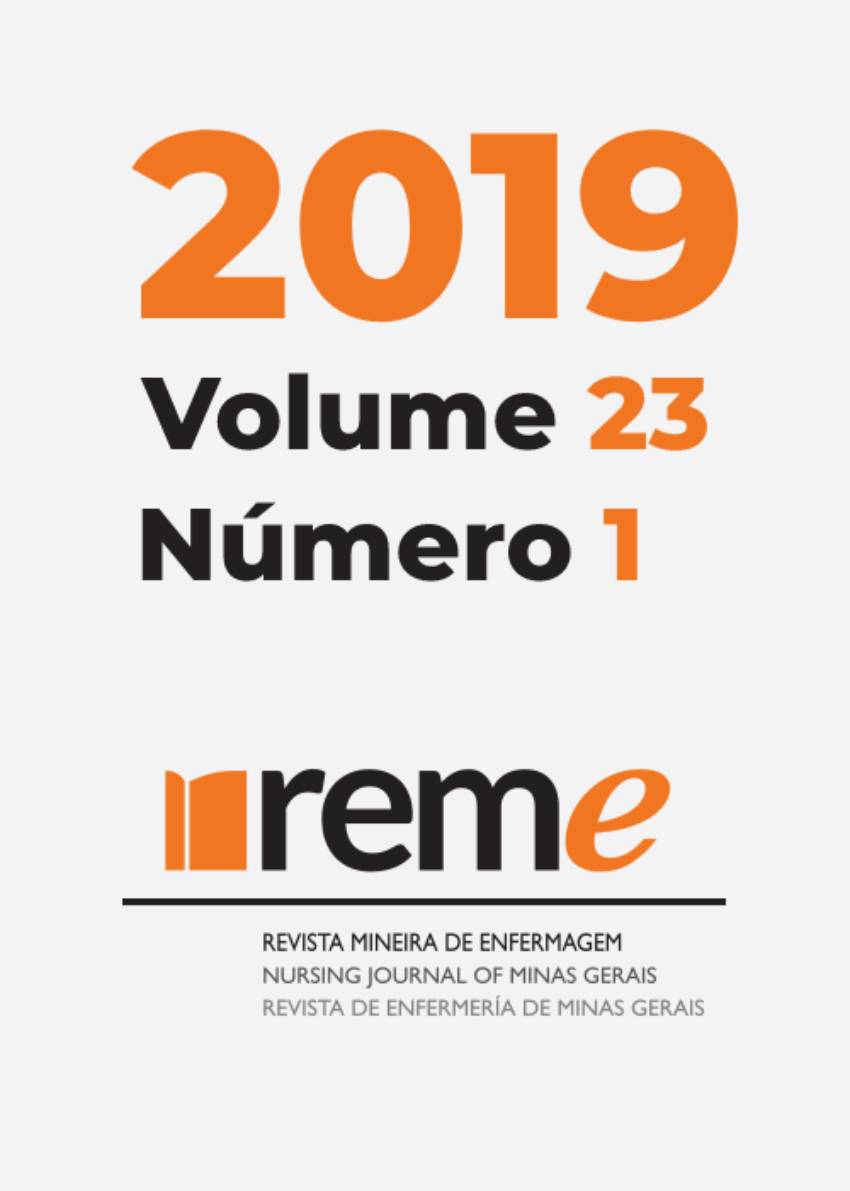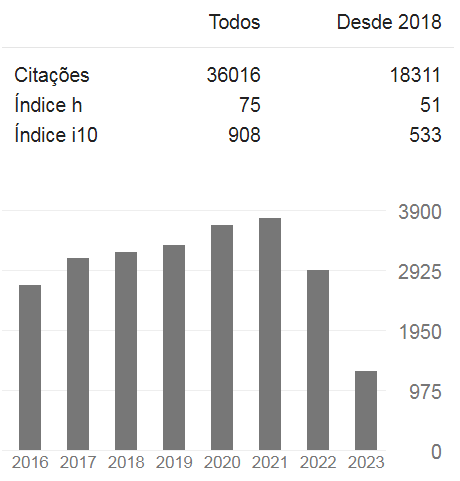Los sentidos de la supervivencia al cáncer
de la pérdida de autocontrol al optimismo y la esperanza
DOI:
https://doi.org/10.5935/1415-2762.20190103Palabras clave:
Supervivencia, Supervivientes de Cáncer, Enfermería Oncológica, Antropologia Médica, Investigación CualitativaResumen
Objetivo: interpretar los significados atribuidos a la supervivencia al cáncer entre enfermos adultos y adultos mayores. Método: estudio exploratorio de enfoque cualitativo con método narrativo y referencial de la antropología médica. En el estudio participaron catorce personas adultas y de edad avanzada que habían completado el tratamiento primario durante, al menos, tres meses en un hospital universitarioy tenían un diagnóstico de cáncer urológico (vejiga, próstata, rihón, testículos). Se realizo una entrevista semiestructurada en los hogares de los participantes entre octubre de 2014 y noviembre de 2015 y, después de su transcripción, los datos se analizaron de acuerdo con el análisis temático inductivo. Resultados: luego del análisis e interpretación de datos, se obtuvieron dos categorías principales: desde la pérdida de autocontrol y la incertidumbre de la recurrencia de la enfermedad hasta la vigilancia corporal; y el secreto de la supervivencia al cáncer: el sentimiento de optimismo y esperanza. Conclusión: después de la interpretación de los sentidos, se hizo evidente que la supervivencia al cáncer es un proceso impregnado de pérdida de autocontrol, incertidumbre, miedo a la recurrencia, asociado con la multimorbilidad y la vigilancia, pero que tarde o temprano puede llevar al sobreviviente al crecimiento personal, valorado más la vida y siendo optimista.
Referencias
Miller KD, Siegel RL, Lin CC, Mariotto AB, Kramer JL, Rowland JH, et al. Cancer treatment and survivorship statistics, 2016. CA Cancer J Clin. 2016[citado em 2018 jan. 21];66(4):271-89. Disponível em: https://onlinelibrary.wiley.com/doi/full/10.3322/caac.21349
Thorne SE, Hislop TG, Kim-Sing C, Oglov V, Oliffe JL, Stajduhar KI. Changing communication needs and preferences across the cancer care trajectory: insights from the patient perspective. Support Care Cancer. 2014[citado em 2018 jan. 21];22(4):1009-15. Disponível em: https://link.springer.com/article/10.1007%2Fs00520-013-2056-4
Gomes IP, Lima KA, Rodrigues LV, Lima RAG, Collet N. Do dagnóstico à sobrevivência do câncer infantil: perspectiva de crianças. Texto Contexto Enferm. 2013[citado em 2018 jan. 21];22(3):671-9. Disponível em: http://www.scielo.br/pdf/tce/v22n3/v22n3a13.pdf
Jacob LA, Shulman LN. Follow-up care of cancer survivors: challenges and survivors. Lancet Oncol. 2017[citado em 2018 jan. 21];18(1):e19-29. Disponível em: https://linkinghub.elsevier.com/retrieve/pii/S1470-2045(16)30386-2
Rowland JH, O'Mara A. Survivorship care planning: unique opportunity to champion integrative oncology? J Natl Cancer Inst Monogr. 2014[citado em 2018 jan. 21];(50):285. Disponível em: https://academic.oup.com/jncimono/articleabstract/2014/50/285/913200?redirectedFrom=fulltext
Zebrack B. A patient-centered perspective on cancer survivorship. J Pers Med. 2015[citado em 2018 jan. 21];5(2):91-5. Disponível em: http://www.mdpi.com/2075-4426/5/2/91
Truant TL, Kohli JK, Stephens JML. Response to "rethinking assumptions about cancer survivorship": a nursing disciplinary perspective. Can Oncol Nurs J. 2014[citado em 2018 jan. 21];24(3):169-73. Disponível em: https://www.researchgate.net/publication/265392067_Response_to_Rethinking_Assumptions_about_Cancer_Survivorship_A_nursing_disciplinary_perspective
Helman CG. Culture, health and illness. Oxford: Holdder Arnold; 2009.
Minayo MCS. Qualitative analysis: theory, steps and reliability. Ciênc Saúde Colet. 2012[citado em 2018 jan. 21];17(3):621-6. Disponível em: http://www.scielo.br/pdf/csc/v17n3/en_v17n3a07.pdf
Squire C. From experience - centred to socioculturally oriented approaches to narrative. In: Andrews M, Squire C, Tamboukon M. Doing narrative research. 2nd ed. Los Angeles: Sage Publications; 2013. p. 47-71.
Braun V, Clarke V. Using thematic analysis in psychology. Qual Res Psychol. 2006[citado em 2018 jan. 21];3(2):77-101. Disponível em: http://eprints.uwe.ac.uk/11735/2/thematic_analysis_revised
Noble H, Smith J. Issues of validity and reliability in qualitative research. Evid Based Nurs. 2015[citado em 2017 set. 23];8(2):34-5. Disponível em: https://ebn.bmj.com/content/18/2/34.long
Geller BM, Vacek PM, Flynn BS, Lord K, Cranmer D. What are cancer survivors' needs and how well are they being met? J Fam Pract. 2014[citado em 2017 set. 23];63(10):7-16. Disponível em: https://www.mdedge.com/familymedicine/article/87617/oncology/what-are-cancer-survivors-needs-and-how-well-are-they-being
Ambrosio L, Garcia JMS, Fernandez MR, Bravo SA, Ayesa SDC, Sesma MEU, et al. Living with chronic illness in adults: a concept analysis. J Clin Nurs. 2015[citado em 2017 set. 23];24(17-18):2357-67. Disponível em: https://onlinelibrary.wiley.com/doi/full/10.1111/jocn.12827
Reeve J, Lloyd-Williams M, Payne S, Dowrick C. Revisiting biographical disruption: exploring individual embodied illness experience in people with terminal cancer. Health (London). 2010[citado em 2017 set. 23];14(2):178-95. Disponível em: https://doi.org/10.1177/1363459309353298
Gibson AF, D'Cruz L, Janda M, Beesley VL, Neale RE, Rowlands IJ. Beyond Survivorship? A discursive analysis of how people with pancreatic cancer negotiate identity transitions in their health. J Health Psychol. 2016[citado em 2017 set. 23];21(12):3060-71. Disponível em: https://doi.org/10.1177/1359105315592050
Ellegaard MB, Grau C, Zachariae R, Jensen BA. Fear of cancer recurrence and unmet needs among breast cancer survivors in the first five years. A cross-sectional study. Acta Oncol. 2017[citado em 2017 set. 23];56(2):314-20. Disponível em: www.tandfonline.com/doi/pdf/10.1080/0284186X.2016.1268714?
Koch-Gallenkamp L, Bertram H, Eberle A, Holleczek B, Schmid-Hopfner S, Waldmann A, et al. Fear of recurrence in long-term cancer survivors-Do cancer type, sex, time since diagnosis, and social support matter? Health Psychol. 2016[citado em 2017 set. 23];35(12):1329-33. Disponível em: https://psycnet.apa.org/doi/10.1037/hea0000374
Lerner K, Vaz P. "My story of overcoming": suffering, testimony and therapeutic practices in cancer narratives. Interface Comun Saúde Educ. 2017[citado em 2017 set. 23];21(61):153-63. Disponível em: http://www.scielo.br/pdf/icse/v21n60/1807-5762-icse-1807-576220150822.pdf
Taplin S. 'Living to tell the tale' narratives of surviving cancer and the social work response. J Social Work Pract. 2016[citado em 2018 fev. 22];30(2):155-68. Disponível em: https://www.tandfonline.com/doi/abs/10.1080/02650533.2016.1168380
Document PI, Trauth JM, Key M, Flatt J, Jernigan J. Breast cancer survivors' perception of survivorship. Oncol Nurs Forum. 2012[citado em 2017 set. 23];39(3):309-15. Disponível em: http://dx.doi.org/10.1188/12. ONF.309-315
Tedeschi RG, Calhoun LG. Posttraumatic growth: conceptual foundations and empirical evidence. Psychol Inq. 2004[citado em 2018 fev. 22];15(1):1-18. Disponível em: http://psycnet.apa.org/record/2004-11807-003
Casellas-Grau A, Ochoa C, Ruini C. Psychological and clinical correlates of posttraumatic growth in cancer: a systematic and critical review. Psychooncol. 2017[citado em 2018 fev. 22];26(12):2007-18. Disponível em: http://dx.doi.org/10.1002/pon.4426
Sim BY, Lee YW, Kim H, Kim SH. Post-traumatic growth in stomach cancer survivors: Prevalence, correlates and relationship with health-related quality of life. Eur J Oncol Nurs. 2015[citado em 2018 fev. 22];19(3):230-6. Disponível em: https://www.ejoncologynursing.com/article/S1462-3889(14)00196-3/fulltext
Melton LM. If I don't laugh, I'll cry: exploring humor coping in breast cancer. J Psychosoc Oncol. 2016[citado em 2018 fev. 22];34(6):530-41. Disponível em: http://dx.doi.org/10.1080/07347332.2016.1233926
Lopes M, Castanheira LN, Zago MMF. Paradox of life among survivors of bladder cancer and treatments. Rev Esc Enferm USP. 2016[citado em 2017 set. 23];50(2):222-9. Disponível em: http://www.scielo.br/pdf/reeusp/v50n2/0080-6234-reeusp-50-02-0224.pdf
Descargas
Publicado
Número
Sección
Licencia
Derechos de autor 2020 Reme: Revista Mineira de Enfermagem

Esta obra está bajo una licencia internacional Creative Commons Atribución 4.0.






































